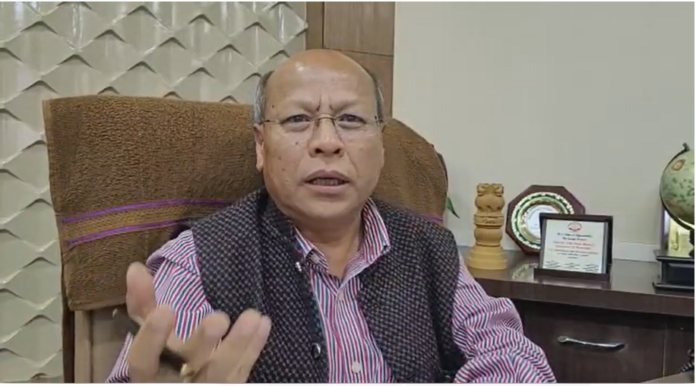SHILLONG:
Deputy Chief Minister Prestone Tynsong has said there is no question of diluting the Meghalaya Residents Safety and Security Act (MRSSA), 2016 as alleged by Leader of Opposition Mukul Sangma and suggested the latter should go and read Meghalaya Residents Safety and Security (Amendment) Bill (MRSSAB), 2020.
He said the government, in fact, wants to further strengthen it.
Mukul Sangma had recently said that the National People’s Party-led Meghalaya Democratic Alliance government was trying to dilute the intent of the Meghalaya Residents Safety and Security Act (MRSSA), 2016.
Sangma had alleged that the state government had undone what has been done so far to address the issue of unabated influx into the state by bringing amendments to the original Act.
On March 19, 2020, the Meghalaya Legislative Assembly had unanimously passed the Meghalaya Residents Safety and Security (Amendment) Bill, 2020 which seeks to regulate the entry of people and their stay as tenants in the state.
However, Governor Satya Pal Malik had reserved the Bill for assent of the President of India.
“There is no dilution. I think Mukul Sangma has to read the amendment properly as he is such a senior politician. He is such a highly educated politician I think he should understand that,” he said.
He said that the decision to amend the MRSSA, 2016 was due to the fact that the entry-exit points were only mentioned in the rules but never in the original Act.
“…in the rules you (then government) did mention entry points and exit points but in the main Act it was not there, it was only specifically meant for the tenants. It is just like a tenancy Act. Whoever comes being a tenant you have to do this, yes, it was there but there was no mention about the exit or entry points. So what we did (as the present government) was we amended the clause by inserting one more clause because before setting up of entry or exit points without the original Act you cannot do anything but in the rules it was there so anybody who goes to court and challenges, we are gone,” he said.
On December 2, 2021, the Meghalaya High Court had said regulating the entry or movement of Indian citizens into and within the state may be not exercised without indicating any parameters.
The order in this regard was passed by the division bench while hearing a PIL which has challenged the validity of the Meghalaya Residents Safety and Security Act, 2016 and the possible draconian manner in which it may be implemented.
“It is made clear that the apparent omnibus charter conferred by the impugned statute without indicating any parameters for restricting or regulating the entry or movement of Indian citizens into and within the State may be not exercised,” the bench had stated in the order.
In the PIL, the petitioners had stated that the gates have been set up at several points for checks to be conducted on persons seeking to enter the State.
They further stated that without any objective parameters being set down for denying entry or regulating the movement of any citizen of the country in the state, such check-posts may be impermissible and the exercise of authority thereat may be wholly arbitrary.
Meanwhile, the MRSSAB, 2020 stressed on the need to verify and regulate the entry of persons to Meghalaya and also to regulate the tenants or any other persons residing in rented houses or any other places in the state apart from the existing provisions of the Principal Act.
The Bill further stated that any person who willfully fails to furnish the information or provides false formation as required as per section 4A shall be liable to be punished under section 176 and /or section 177 of the Indian Penal Code, 1860.
“Provided that the first offense under this section shall be punishable only by imposition of a fine as provided in the Indian Penal Code, 1860,” it said.


